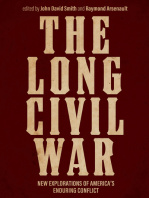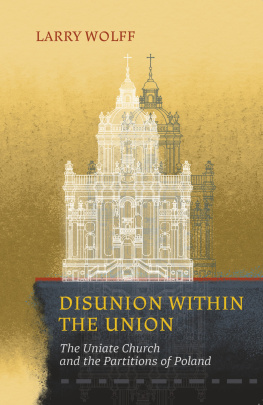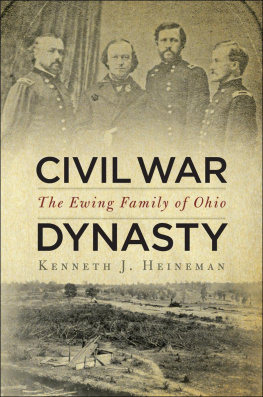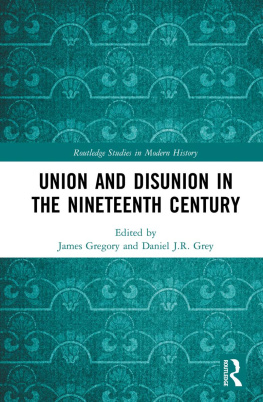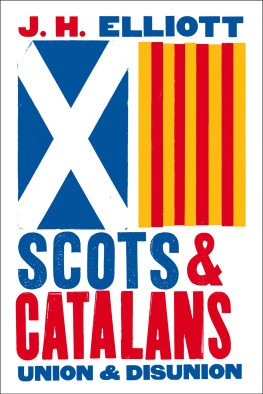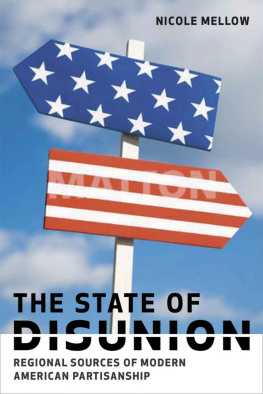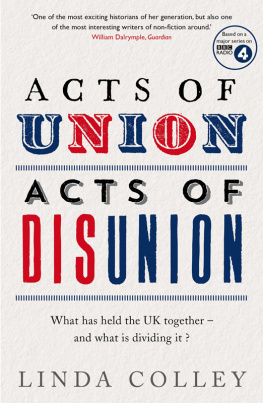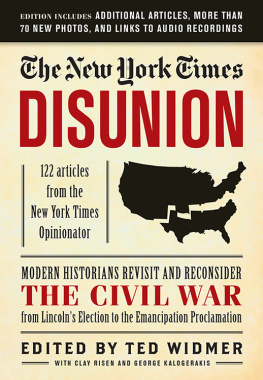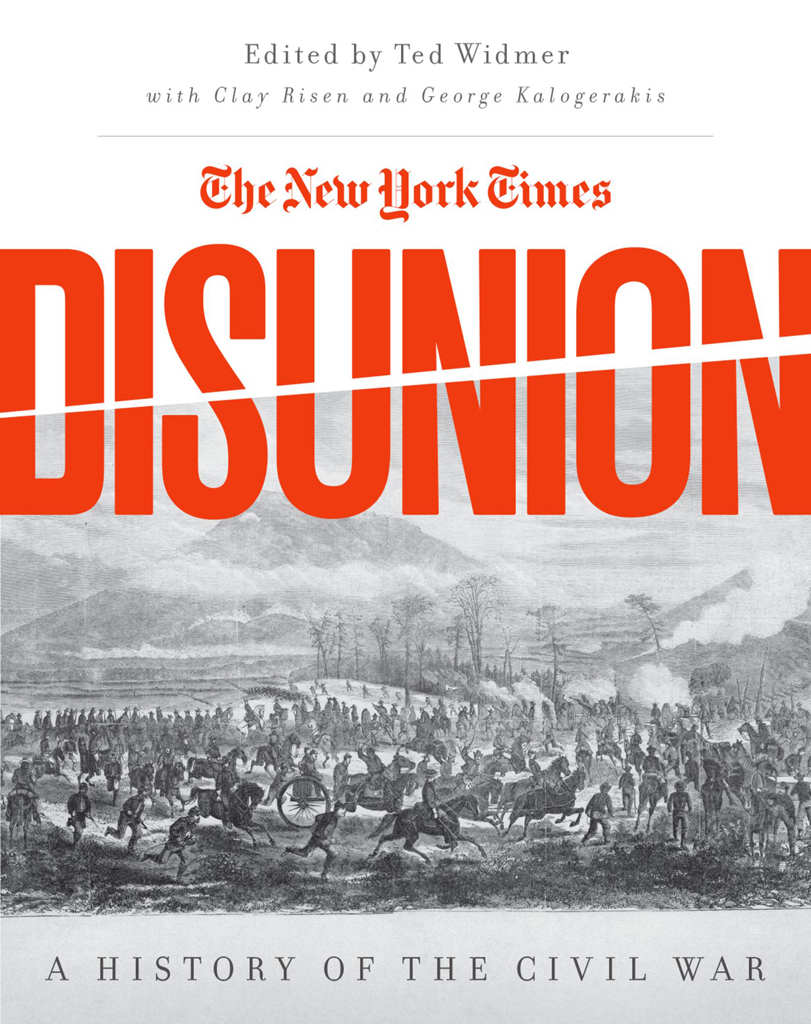The New York Times
DISUNION
The New York Times
DISUNION
A HISTORY OF THE CIVIL WAR

EDITED BY TED WIDMER
WITH CLAY RISEN AND GEORGE KALOGERAKIS


Oxford University Press is a department of the University of Oxford. It furthers the Universitys objective of excellence in research, scholarship, and education by publishing worldwide. Oxford is a registered trade mark of Oxford University Press in the UK and certain other countries. Published in the United States of America by Oxford University Press
198 Madison Avenue, New York, NY 10016, United States of America.
The New York Times 2016
All rights reserved. No part of this publication may be reproduced, stored in a retrieval system, or transmitted, in any form or by any means, without the prior permission in writing of Oxford University Press, or as expressly permitted by law, by license, or under terms agreed with the appropriate reproduction rights organization. Inquiries concerning reproduction outside the scope of the above should be sent to the Rights Department, Oxford University Press, at the address above.
You must not circulate this work in any other form and you must impose this same condition on any acquirer.
Library of Congress Cataloging-in-Publication Data
Names: Widmer, Edward L., editor. | Risen, Clay, editor. | Kalogerakis, George, editor.
Title: The New York Times disunion : a history of the Civil War / edited by Ted Widmer, with Clay Risen and George Kalogerakis.
Other titles: New York times
Description: New York : Oxford University Press, 2016. | Includes bibliographical references and index.
Identifiers: LCCN 2016015114 | ISBN 9780190621834 | eISBN 9780190621858
Subjects: LCSH: United StatesHistoryCivil War, 1861-1865.
Classification: LCC E468 .N493 2016 | DDC 973.7dc23
LC record available at https://lccn.loc.gov/2016015114
CONTENTS

Ken Burns
Ted Widmer
Adam Goodheart
Richard Striner
David Blight
Manisha Sinha
Jean H. Baker
Charles Lockwood and John Lockwood
Susan Schulten
Richard Parker
Gregory P. Downs
Manisha Sinha
Susan Schulten
David Eltis and David Richardson
Steven Hahn
Susan Eva ODonovan
Adam Goodheart
Daniel J. Sharfstein
Gregory P. Downs and James Downs
Adam Rothman
Blain Roberts and Ethan J. Kytle
Blain Roberts and Ethan J. Kytle
Nicole Etcheson
Elizabeth R. Varon
Jon Grinspan
Albin J. Kowalewski
Alecia P. Long
Ellen Gruber Garvey
Ford Risley
Nicole Etcheson
Jennifer R. Bridge
Jean R. Freedman
George Kirsch
Gary Gallagher
Michael O. Varhola
Jamie Stiehm
Cate Lineberry
Carol Bundy
Lawrence A. Kreiser Jr.
James Q. Whitman
Glenn David Brasher
Carole Emberton
Pat Leonard
Peter Cozzens
Jon Grinspan
Thom Bassett
Boyd Cothran
Adam Goodheart
Richard Parker
Adam Goodheart
Susan Schulten
Richard Parker
Adam Arenson
Nicole Etcheson
Melinda Miller and Rachel Smith Purvis
Jim McWilliams
John Fabian Witt
Paul Finkelman
John Fabian Witt
Rick Beard
Crystal N. Feimster
Douglas L. Wilson
Gerard Magliocca
Frank J. Williams
William Moss Wilson
Joseph S. Moore
Paul Finkelman
Stephanie McCurry
John J. Miller
Adam Goodheart
Phil Leigh
Christian McWhirter
Kenneth W. Noe
Terry L. Jones
Sue Eisenfeld
Yael A. Sternhell
Elizabeth R. Varon
Ron Soodalter
Don H. Doyle
William Moss Wilson
Adam Goodheart
Don H. Doyle
Kenneth Weisbrode
Aaron W. Marrs
Michael J. Douma
Jeffrey Allen Smith
Rick Beard
Jamie Malanowski
Louis P. Masur
Harold Holzer
Russell McClintock
Guy Gugliotta
Aaron Astor
Mark Greenbaum
Paul Finkelman
Mark Greenbaum
Jeffrey Allen Smith and B. Christopher Frueh
Martin P. Johnson
Rick Beard
Heather Cox Richardson
Joshua Zeitz
Paul Quigley
Terry L. Jones
Edward P. Kohn
Ted Widmer
Amanda Brickell Bellows
Joshua Zeitz
Christopher Phillips
Jon Grinspan
Don Doyle
Ted Widmer

The Old Guilts
Our decadent experimentation with disunion began in so many places that it is difficult to fix precisely its origin. Was it in the monumental hypocrisy of our founding, our ignominious acceptance of chattel slavery, even after a century of Enlightenment thinking had been artfully distilled, poetically articulated, and then proudly proclaimed to mankind that we the people believed in certain universal truths? Was it the corrupt bargains of the constitutional conventions and slaverys subsequent enshrinement into our manual of operation, with its sickening tolerance of three-fifths of a person?
Maybe it was the impertinence of a growing number of Americans, dedicated to abolition and emancipation, who threatened the immoral profits of the Southern states property. Maybe it was all the imperfect geographical compromises that dripped out over the ensuing decades, compromises that seemed to propel us inevitably toward carnage. Or was it the legislative and judicial embarrassments of the Fugitive Slave Act and the Dred Scott decision? Perhaps it was John Browns murderous raid in Pottawatomie, Bleeding Kansas, followed by his blatant insurrection at Harpers Ferry. Or Nat Turners own brave, futile attempt at liberation for his people and himself. Maybe it was, as Lincoln joked, little Stowes big book. Perhaps, as the writer and historian Shelby Foote believed, it was our failure to compromise (our great genius, he thought) that brought our civil war. Historians will forever debate and assign significance to each of these examples and dozens more.
Today, even with a century and a half between us and our greatest cataclysm, we have an eerie sense that so much of what seemed safely finished and distant about the Civil War now seems present, palpable, the underlying racial causes of the old conflict on nearly daily display. We begin to think with increasing alarm that it has always been with us; our interim historical glare has been distracted by other more important events. Black lives still dont matter, it seems, and we are faced with the crushing reality of a truth we thought had slipped into discarded clich: that slavery and its consequences, including the Civil War, are our original sin. The jazz trumpeter and composer Wynton Marsalis says that in our country the question of race is like the thing in the story, in the mythology that you have to do for the kingdom to be well. We are not well, and it becomes increasingly clear that the ghosts and echoes of our near-death experience have much to teach us today.


